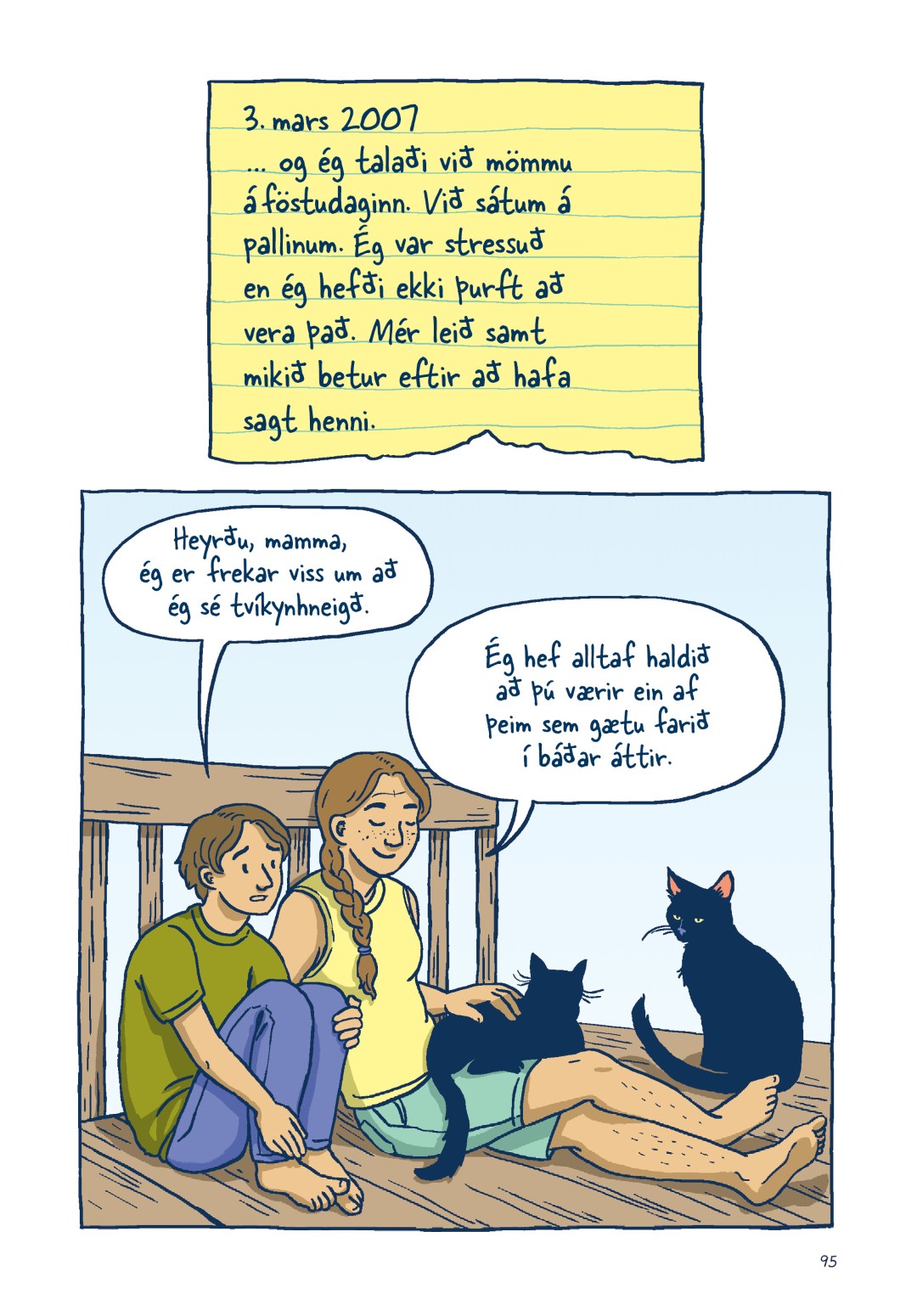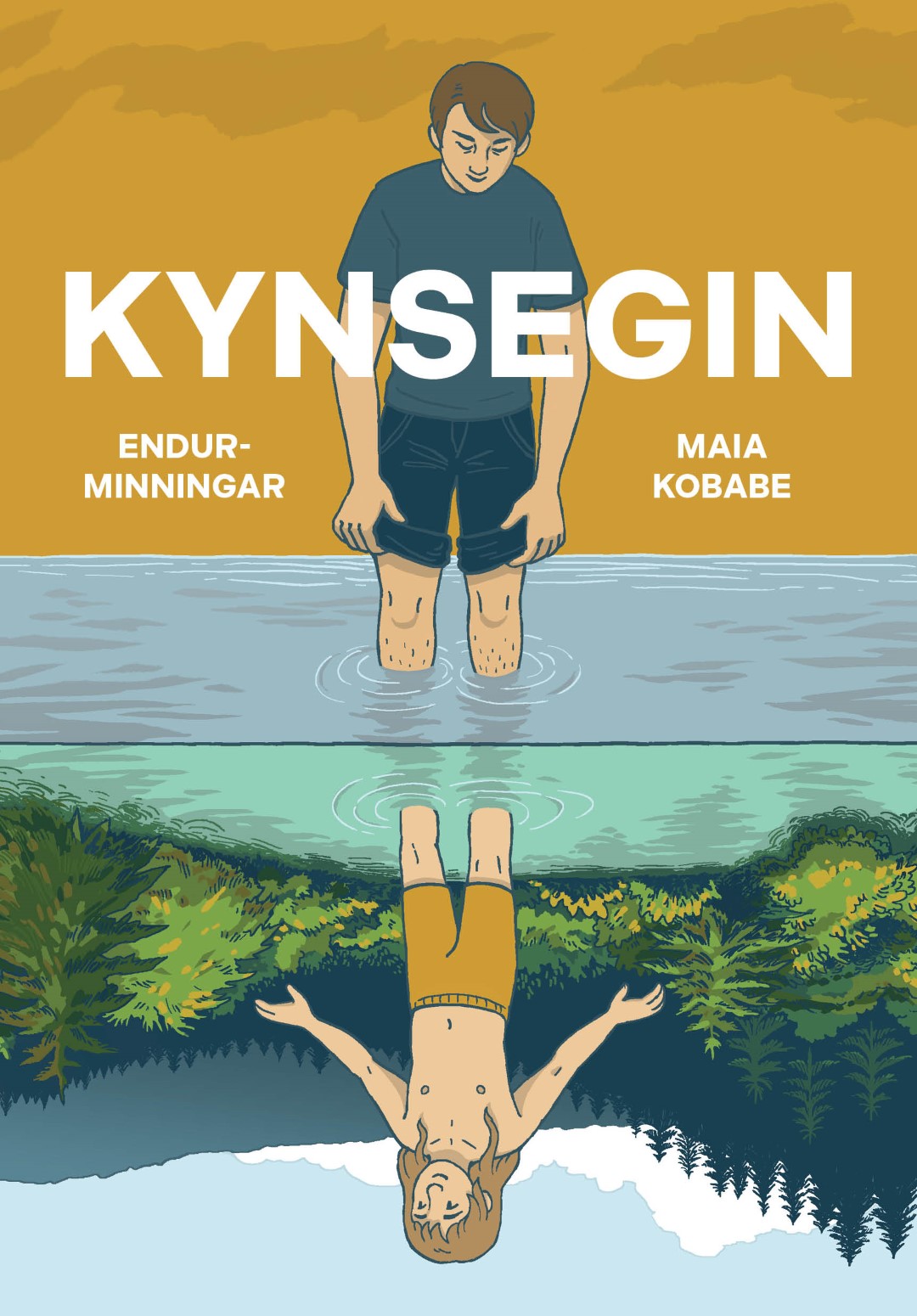In 2014, Maia Kobabe (e/em/eir) published Gender Queer: A Memoir, a cathartic autobiography and touching guide on the journey of gender and self identity. Since it was published, the work has been translated into many languages, but not Icelandic – until now.
GayIceland sat down with Mars M. Proppé and Elías Rúni to talk about translating Maia Kobabe’s work into the Icelandic language and the impact the book has had on them.

Mars: “The book is a graphic novel of Maia’s life story from when e was a child up until the present. It handles themes of self-discovery, queerness, clashing with societal norms and the beauty of finding oneself. It has become one of the best-known books on genderqueer identity.
The work itself has attracted some attention from conservatives, due to its unflinching nature and subject matter.”
Elías: “It’s also, to the best of my knowledge, one of the first books to talk about being non-binary, and it does so quite bluntly and openly. Therefore it has also achieved the title of being one of the most banned books in the USA, some years even in the top seat.
I believe part of what makes the book so disputed is the fact that it’s a graphic novel and shows explicitly what’s being talked about, rather than hiding it between the lines, which is what makes it such an intriguing work.”
The fact that the book has been banned in schools and libraries in the USA shows how deeply political these things are still.
Although the work has attracted controversy, there’s no doubt for Elias and Mars about its importance for people exploring their own genderqueer identities and the availability of that language in their native tongue.

Elías: “It had actually never occurred to me to translate a book until Mars approached me with this project. I really wasn’t sure that I could work as a translator but it happened without much planning. We started talking about the uniqueness of this book and the importance of a queer vocabulary existing in Icelandic. So I’m happy that Mars asked me to be a part of this.”
Mars first became aware of Gender Queer whilst studying in Canada, picking up a copy in a ‘little queer bookshop in Montréal’.
“At the time I had recently come to terms with the fact that I was non-binary and was having a pretty hard time imagining what my future would look like.
At first I was a little disappointed reading it, but then I realised that one of the most important factors of the book was that we do not all have to have the exact same story in order to be a part of the same community.
I have read it innumerable times since and come to love it dearly.”
It’s also, to the best of my knowledge, one of the first books to talk about being non-binary, and it does so quite bluntly and openly.
To Mars and Elías, GenderQueer is a key piece of non-binary representation, but there is still a lack of much needed representation in all areas of life and media.
Mars: “When our stories are told, it is often in a very specific way which presents us as a monolith, as if we all have had the same experiences of life. Which is why I feel that a book like this is so important, because it dives super deep into one person’s story, but does not claim to be the story of all non-binary people.”

Elías: “There are more non-binary characters appearing in books and TV but what I feel is missing are deep non-binary characters. Too often they are used like an accessory, without having any personality or motives. It’s similar to what we see regarding other minority groups, their whole personality appears to be centered around whatever makes them a minority.”
For Mars and Elias, the lack of genuine and multi-dimensional trans and non-binary representation stems from deep societal, cultural and political factors.
Mars: “Queerness in many forms used to be much more abundant in many cultures, until the the takeover of western ideas through colonialism and globalisation.
We are all part of the gender binary and reading about people outside that can put things in a new perspective.
It’s only become safe to tell trans and non-binary people’s stories in the last few years, and it is still not safe everywhere.
The fact that the book has been banned in schools and libraries in the USA shows how deeply political these things are still.”

Elías: “Closer to home, when we were looking for publishers for this book we were told by one publisher it would be too niche.
It’s disheartening to hear that there isn’t room for non-binary stories of all kinds and that cis people wouldn’t relate to it. We are all part of the gender binary and reading about people outside that can put things in a new perspective.”
Gender Queer provides some relief to the shallow, incomplete, and sparse non binary representation in literature and media.
Elías: “We get to know the main character, Maia, not only as a non-binary person but as an artist, a writer and a devoted One Direction fan. In the book, e talks about things that have nothing to do with being non-binary and that is so important because being queer is just a part of a person’s identity. It can be a very big part that affects other aspects of their existence but it’s not the sole element defining that person.”
Mars and Elías are confident that the book will appeal to Icelandic readers, given the country’s strong queer scene and shifting attitudes towards how gender is understood.
They think the translation of this book will allow Icelanders to read and talk about the non-binary experience in their own language with the added accessibility of being a graphic novel.
For Mars and Elías, “it’s an honest and sincere story that won’t leave anyone untouched”.
Gender Queer: A Memoir is being published in Icelandic by Salka.


